First published in 1975, this classic book gives a systematic account of transcendental number theory, that is, the theory of those numbers that cannot be expressed as the roots of algebraic equations having rational coefficients. Their study has developed into a fertile and extensive theory, which continues to see rapid progress today. Expositions are presented of theories relating to linear forms in the logarithms of algebraic numbers, of Schmidt's generalization of the Thue-Siegel-Roth theorem, of Shidlovsky's work on Siegel's E-functions and of Sprindzuk's solution to the Mahler conjecture. This edition includes an introduction written by David Masser describing Baker's achievement, surveying the content of each chapter and explaining the main argument of Baker's method in broad strokes. A new afterword lists recent developments related to Baker's work.
Dieser Download kann aus rechtlichen Gründen nur mit Rechnungsadresse in A, B, BG, CY, CZ, D, DK, EW, E, FIN, F, GR, HR, H, IRL, I, LT, L, LR, M, NL, PL, P, R, S, SLO, SK ausgeliefert werden.


